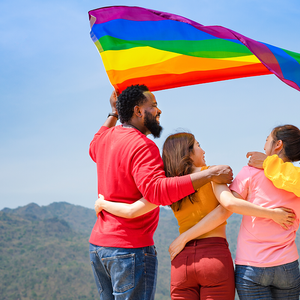CONTACTStaffCAREER OPPORTUNITIESADVERTISE WITH USPRIVACY POLICYPRIVACY PREFERENCESTERMS OF USELEGAL NOTICE
© 2024 Pride Publishing Inc.
All Rights reserved
All Rights reserved
By continuing to use our site, you agree to our Private Policy and Terms of Use.
The court that could ultimately decide whether same-sex marriages are legal in New York State may be dominated by Gov. George Pataki's nominees, but that may not give him much comfort. The court of appeals' two most significant rulings in the past 18 months were both major defeats for Pataki, a moderate Republican who is adamantly opposed to same-sex marriage. It effectively invalidated the death penalty, which Pataki promised to reinstate when he defeated Democratic incumbent Mario Cuomo in 1994. And it ordered the state to pour billions of dollars more into New York City schools. "It's difficult to handicap the court," said Larry Moss, an expert on New York marriage law. "The result is unpredictable, and anyone who tries to tell you that they know what the court of appeals is going to do is not being very helpful." The court's next potential flashpoint in this largely Democratic state could be same-sex marriage--an issue that might arrive at the courthouse steps from two directions. New York City lawyers will ask the court of appeals to take a direct appeal of a state supreme court ruling last week that said five same-sex couples can marry in New York City. If the court accepts, the case will skip the mid-level appellate division of the state supreme court, speeding a final ruling by several months. Chief court of appeals judge Judith Kaye declined this week to say if the court will take the case right away. The court is also being asked to do the same thing in an Albany case in which same-sex marriages were ruled illegal. "I expect someday the issue will come to us, whether in this case or another case," Kaye said. Over the past 25 years, the court has ruled favorably on other cases involving gay rights. In 1980 it decriminalized acts among consenting adults formerly defined as sodomy. Fifteen years later it decided that the domestic partner of a parent--even if gay--could legally become an adoptive parent of their partner's child. And in 1998 the court said the life partner of the occupant of a rent-controlled apartment in New York City could continue to hold that dwelling because he or she had a long-term relationship "characterized by an emotional and financial commitment." "New York does by now have a very substantial track record of recognizing same-sex relationships," said Jay Weiner, lead author of a 2001 New York City Bar Association report that concluded that same-sex marriages in the state are legal. The current court has three holdovers picked by the liberal Cuomo, including Kaye, and four justices selected by Pataki. All were confirmed by the Republican-controlled state senate. The three Cuomo selections are seen as making up a liberal-to-moderate bloc, while the four Pataki judges swing in the moderate-conservative direction. Pataki denies using a litmus test, such as a prospective judge's stance on capital punishment, to select members for the court's 14-year terms. The governor has said he picks judges he believes will employ "common sense" when interpreting the law and not look to thwart criminal convictions on technicalities. The court under Pataki has continued a tradition that began in the 1970s of interpreting New York's constitution more broadly than the U.S. Supreme Court does the federal Constitution. That has given New Yorkers somewhat greater civil liberties, more protections against police searches, and other freedoms than those the U.S. Supreme Court has recognized. While the U.S. Supreme Court will be "very slow" to recognize same-sex marriages, Moss predicted moderate state courts such as New York's will begin "acknowledging that marriage is a fundamental right" and that excluding same-sex couples violates their constitutional guarantees. That's the hope of Susan Sommer, a lawyer for Lambda Legal, a gay rights advocacy group. "The federal Constitution is the floor, but New York has long cherished constitutional rights and individual liberties," she said. "This is one of the leading high courts in the country and a court that has been very protective of individual liberties and constitutional rights." Those on the other side of the gay marriage issue also hope the appeals court rules on their side. State senator Serphin Maltese, a former chairman of the state Conservative Party, said he hopes the court will recognize that it's up to the legislature and the governor to define marriage, not the courts. The Reverend Duane Motley, head of the conservative Christian group New Yorkers for Constitutional Freedoms, said that unless the court is willing to stretch the state constitution "like a rubber band," it must rule that same-sex couples cannot legally wed in New York. (AP)
Want more breaking equality news & trending entertainment stories?
Check out our NEW 24/7 streaming service: the Advocate Channel!
Download the Advocate Channel App for your mobile phone and your favorite streaming device!
From our Sponsors
Most Popular
Here Are Our 2024 Election Predictions. Will They Come True?
November 07 2023 1:46 PM
Meet all 37 of the queer women in this season's WNBA
April 17 2024 11:24 AM
17 Celebs Who Are Out & Proud of Their Trans & Nonbinary Kids
November 30 2023 10:41 AM
Here Are the 15 Most LGBTQ-Friendly Cities in the U.S.
November 01 2023 5:09 PM
Which State Is the Queerest? These Are the States With the Most LGBTQ+ People
December 11 2023 10:00 AM
These 27 Senate Hearing Room Gay Sex Jokes Are Truly Exquisite
December 17 2023 3:33 PM
10 Cheeky and Homoerotic Photos From Bob Mizer's Nude Films
November 18 2023 10:05 PM
42 Flaming Hot Photos From 2024's Australian Firefighters Calendar
November 10 2023 6:08 PM
These Are the 5 States With the Smallest Percentage of LGBTQ+ People
December 13 2023 9:15 AM
Here are the 15 gayest travel destinations in the world: report
March 26 2024 9:23 AM
Watch Now: Advocate Channel
Trending Stories & News
For more news and videos on advocatechannel.com, click here.
Trending Stories & News
For more news and videos on advocatechannel.com, click here.
Latest Stories
Black trans woman África Parrilla García shot to death in Puerto Rico
April 18 2024 4:55 PM
Marjorie Taylor Greene has sunk so low even Fox News can't stand her anymore
April 18 2024 4:04 PM
Single lesbians are avoided by straight women, but not straight men. Here's why.
April 18 2024 3:18 PM
The LGBTQ+ movie fan's guide to the 2024 TCM Classic Film Festival
April 18 2024 2:44 PM
The federal government failed on mpox. Ritchie Torres's new bill addresses that (exclusive)
April 18 2024 1:21 PM
True
In the face of tweets and turmoil, why I left the South as a medical student
April 18 2024 7:30 AM
Trans man Tee Arnold shot to death in Florida
April 17 2024 4:41 PM
Can scientific research on the causes of homosexuality be used against LGBTQ+ people?
April 17 2024 4:02 PM
Trending stories
Most Recent
Recommended Stories for You

















































































